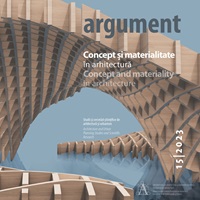Explorarea si discretizarea spațiului latent al imaginației algoritmice prin computare afectivă
Exploring and discretizing the latent space of algorithmic imagination through affective computation
Author(s): Andreea Robu-Movilă, Sabin-Andrei ȚeneaSubject(s): Architecture, ICT Information and Communications Technologies, Sociology of Art, History of Art
Published by: Editura Universitară “Ion Mincu”
Keywords: Generative Design; Latent Space; Choice Paradox; Decision Making; Affective Computation;
Summary/Abstract: The field of architecture has undergone many transformations in recent years, given the integration of generative algorithms and artificial intelligence systems that mark the shift from tools designed to do to tools designed to think. Thus, computation is no longer just a design tool, but aims to become the design method in itself. This article aims to address one of the implications of the “second digital turn” (Carpo, 2017) in architecture, addressing the paradox of choice that derives from the exploration of the latent space of algorithmic imagination by the human factor, in the post-generative stages of the design process. This study brings to light the potential of affective computing as a tool that can be employed to address this matter, and within this method the opportunities of the ERP component are distinctly highlighted. One of the challenges of generative design is the paradox of choice given by the excess of generated solutions, which makes architects become overwhelmed, confused and over-stimulated in their decision making in the face of the abundance of solutions produced by the algorithmic and generative phases. The authors address this issue by examining how emotions currently support decision-making and how they can be interpreted in the digital environment through “affective computing” (Picard, 1997) which is a Human-Computer Interface (HCI) based on the capture of physiological electroencephalographic EEG signals. Within this paradigm, the Event-Related Potential (ERP) component has been identified to access unconscious decisions within the visual semantic discretization process. The paper articulates on the hypothesis of relocating the decision control in favour of the human factor through affective computation in generative design processes. This method is capable to reduce the “execution gulf” and the “evaluation gulf” (Hutchins, 1985), i.e. the articulatory distance between concept and evaluation. The study will analyze the premises underlying this hypothesis and test an accessible HCI model based on an EMOTIV EPOC X headset, validating the functionality of this proposed framework.
Journal: Argument
- Issue Year: 15/2023
- Issue No: 15
- Page Range: 192-208
- Page Count: 17
- Language: English, Romanian

